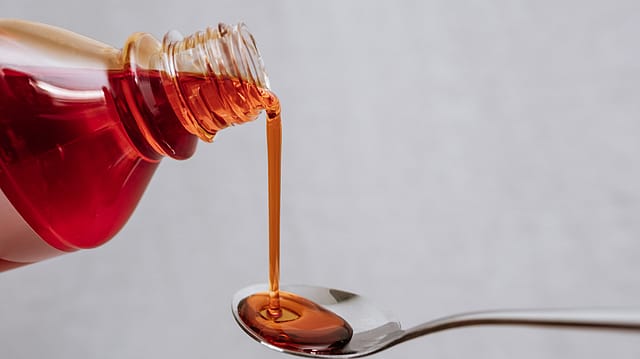WHO flags ‘contaminated’ syrup batch by India-based Fourrts Lab in Iraq
ADVERTISEMENT

In yet another alert against an India-based pharma company, the World Health Organisation (WHO) via its latest 'Medical Product Alert' has flagged about one batch of substandard 'COLD OUT' syrup in Iraq, which was manufactured by Fourrts (India) Laboratories Pvt Ltd for Dabilife Pharma Pvt Ltd.
The global alert refers to one batch of substandard (contaminated) COLD OUT syrup (paracetamol and chlorpheniramine maleate), which the WHO says was reported to it on July 10, 2023, by a third party. Fourrts is a Chennai-based pharmaceutical company, while Dabilife Pharma is headquartered in Mumbai.
Paracetamol and chlorpheniramine combination, contained in the said syrups, are used to treat and relieve symptoms of the common cold and allergy.
In its inquiry, the WHO says a sample of the COLD OUT Syrup was obtained from one location in Iraq and submitted for laboratory analysis. The sample was found to contain "unacceptable amounts" of diethylene glycol (0.25%) and ethylene glycol (2.1%) as contaminants.
Notably, the acceptable safety limit for both ethylene glycol and diethylene glycol is no more than 0.10%.
The WHO has clarified that while the latest alert only relates to one batch of the product, out of an abundance of caution, it recommends increased vigilance and testing in respect of the product in general.
The Chennai-based company and the marketer have so far not provided guarantees to the WHO on the safety and quality of the product, says the US-based global health organisation.
"The product referenced in this Alert may have marketing authorisations in other countries or regions. It may also have been distributed, through informal markets, to other countries."
On the risks associated with products containing ethylene glycol and diethylene glycol higher than the safety limit, the WHO says they can be "fatal" when consumed by humans. It says the highlighted batch is "unsafe" and its use, especially in children, may result in serious "injury or death".
Toxic effects can include abdominal pain, vomiting, diarrhoea, inability to pass urine, headache, altered mental state, and acute kidney injury, which may lead to death, the WHO says.
The global health body has advised regulatory authorities and the public to not use the flagged batch of the product. "If you, or someone you know, has, or may have used the affected product, or suffered an adverse reaction or unexpected side-effects after use, you are advised to seek immediate medical advice from a healthcare professional."
The WHO has also said manufacturers of liquid dosage forms, especially syrups that contain excipients, including propylene glycol, polyethylene glycol, sorbitol, and/or glycerin/glycerol, are urged to test for the presence of contaminants such as ethylene glycol and diethylene glycol before use in medicines.
This is not the first time when the WHO has flagged issues with Indian pharma products exceeding the prescribed limits of ethylene glycol and diethylene glycol. Some Indian pharma companies exporting their products have faced major scrutiny from the WHO in the recent past.
In April 2023, the WHO warned against contaminated cough syrup made by Punjab-based pharma company, QP Pharmachem (Punjab), and marketed by Trillium Pharma (Haryana). These were being sold in the Marshall Islands and Micronesia.
The contaminated syrup, Guaifenesin Syrup TG Syrup, which is an expectorant used to relieve chest congestion and the symptoms of cough, was also found to have "unacceptable amounts of diethylene glycol and ethylene glycol as contaminants".
In January 2023, the WHO issued an alert advisory, saying certain cough syrups made by Noida-based Marion Biotech Pvt Ltd were “substandard”, and that their use, especially in children, may result in “serious injury or death”. These products also had unacceptable amounts of diethylene glycol and ethylene glycol.
Earlier this year, the national pharmaceutical regulatory body Central Drugs Standards Control Organisation (CDSCO) had also flagged five cough syrup samples produced by Maiden Pharmaceuticals at its Baddi plant in Himachal Pradesh as "not of standard quality" or spurious".
The syrup batches flagged by the government body were cough syrups for throat and chesty coughs, manufactured in August 2021 and they will expire in July 2024. The reasons for failing the quality standard were mentioned as the assay of codeine phosphate & menthol; assay of codeine phosphate, among others.